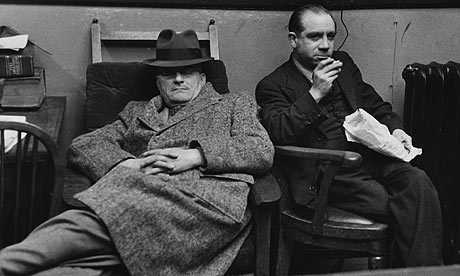
In a world of declining newspapers, is there any future for the newspaper novel? I recently stormed through Michael Frayn's satirical 1967 newspaper novel, Towards the End of the Morning, and Nick Davies' scathing study of how reporting works now, Flat Earth News. For the press, dawn is closing time, when the final edition has been printed and the hacks can go to bed – so Frayn's title is a reversal of the usual metaphor: the end of the morning implies more of a shutdown than a rebirth. The novel, with its warm satire of the gentlemanly dissolution of the newspaperman in the fading days of old Fleet Street, makes a tender record of a deeply flawed but somehow loveable industry – before colour printing, before Wapping, and back when TV had only just begun to threaten the papers' ownership of the news and comment business.
In the sleepy offices of a national paper (the kind of place so sleepy that a man can put his head down and die without his lack of productivity being noticed) Bob, a junior hack, and his floundering boss John struggle against the creeping inertia of long lunches and tedious copy. When their department is invaded by Erskine Morris – a young man with shallow yet implacable ambitions – they find themselves rapidly outmanoeuvred. Morris isn't even a newspaper man: he's a media man, who sees the paper as a thing to be stepped over on his way to greater attainments in pop music and broadcasting, and isn't even interested in the pub or the glorious freebies.
All the elements are wound tightly for a farcical climax. There's a sniff of sexual jealousy between the two hacks over John's wife, a peck of career rivalry as they both race to arrive at the same career-making TV appearance, and the possibility of juddering public embarrassment for whichever gets on screen. But when the clinching revelation comes, and it transpires that thrusting youth has managed to take over both the newsroom and the airwaves, all the carefully-assembled plot points collapse. For Frayn's novel, the victory of Morris's multi-platform entertainment enterprise over the gentle rhythms of old print is enough to knock the substance out of all his narrative altogether. Even though nothing much has happened, the novel ends with the feeling that something has changed forever in the newspaper business.
Frayn's not sentimental enough to pretend that his chappish newspapermen are a golden class of journalist. Even the competent ones in the backwater departments are pretty lazy, and all of them, in one way or another, are on the take. But compared with the aggressive and venal world described by Davies in Flat Earth News, where news desks are feverish boiler-rooms of bullying and newsgathering can have more to do with committing than uncovering crimes, this is an endearingly harmless world.
And set against the current anguish of newspapers facing off against the internet, the alarm over new proprietors and a growing broadcast industry encountered in Frayn's fictional newspaper seems misplaced. Bob and John might end the novel feeling like they've witnessed the beginning of the end, but plenty of journalists now can be justifiably concerned that we're witnessing the end of the end as newspapers cast around for a business model that can keep them going.
So if the newspaper is suffering, is the newspaper novel also doomed? Perhaps the shambolic journo has run his course as a hero in fiction, and there simply aren't going to be anymore Bobs and Johns (or Fred Hales and William Boots) to smudge their fingers and pickle their insides. Let's hope not: whatever the citizen journalists might be capable of, they'll never have the shabby glamour of fiction's press pack.

